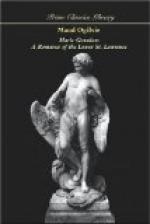A well-put together picture, the critics said, and a new scene which in these days is much to be desired. The manner in which Lacroix had arranged to show both the exterior and interior of the church was a clever hit, every one agreed. Outside, with the clear blue sky for background, the spire of the church was clearly defined, and on a niche just above the main doorway stood an exquisitely carved statue of the patron St. Anne, holding by the hand her little daughter, the Blessed Virgin. And beyond the church and the mass of sorrowing, suffering human life at its doors was the great River St. Lawrence, a molten silver stream glimmering with a million iridescent lights, flowing swiftly, silently on.
Far across its broad expanse, in the dim distance, like huge clouds, were the misty blue Laurentian hills, grand, eternal, steadfast, an emblem of Omnipotence itself.
“Where is the painter of this masterpiece?” asked one; and a friend of his, a Royal Academician of some standing, replied:
“Oh! Lacroix has just come in. The prince admired ‘The Pilgrimage’ and inquired for the artist, so the president sent for him. The prince was most affable to him, and, it is said, has bought the picture. Ah! there is Lacroix now. Wait a moment and I will bring him over here.”
Presently he returned with Lacroix, who was enthusiastically received by his fellow artists, and congratulated heartily on his success. Lacroix was a tall, rather uncouth-looking man of between thirty-five and forty, and his face wore a stern, care-worn expression. But, to an observer who cared to study his countenance, over the stern gravity of the artist’s face there was often a gleam of pleasing expression, more particularly when lighted up by one of his rare smiles. To-day he did not seem very much elated by his success; rather the contrary. Success had come to Lacroix too late in life for him to have any very jubilant feeling about it. It seemed that he had long out-lived his youth, its hopes and ambitions. Work was what he lived for now, work and his art; if success followed, well and good; if not, he did not much care.
“Yes,” he said, in a voice with a slight French accent, in reply to some question they had asked him, “I studied in Paris, then I came to London last year, and have been here ever since; but, I may say, I received all my training in France.”
“Ah! I thought so,” said the little French artist. “Your style is too good for the English school. You are a Canadian, I hear. We have a good many Canadians in London this year. I went to hear one sing last night at Her Majesty’s, Mademoiselle Laurentia. Do you know her? I can assure you she is superb. She is a Canadian, too.”
“I did know her many, years ago,” said Lacroix; “but I have seldom seen her of late; in fact, I don’t think she would remember me now.”
“She is here to-day, I am told,” said the little Frenchman, looking round the gallery. “Ah! there she is talking to Lady D——. See, there, that little lady in grey!”




